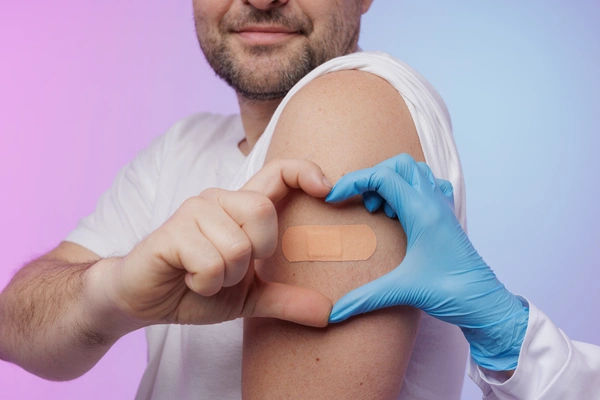What Blood Tests Should You Take for Allergic Rashes? A Complete Guide for Children and Young Adults
Worried about your child's allergic rash? Discover the essential blood tests for children and young adults with allergic rashes in this comprehensive guide. Learn what tests to ask for, what they reveal, and how to get an accurate diagnosis for effective treatment.

Written by
Last updated on 4th Aug, 2025

What Blood Tests Should You Take for Allergic Rashes? A Complete Guide for Children and Young Adults
Allergic rashes are a common skin concern, especially among children and young adults. These red, itchy, or inflamed patches can occur suddenly and may be triggered by a wide range of allergens, from food and pollen to insect bites, medications, or contact with certain fabrics and metals. While many allergic reactions are mild, some may be part of a more serious immune response or indicate underlying allergies that need further attention. Identifying the exact cause is essential to prevent recurrence and manage symptoms effectively.
This is where blood tests for allergic rashes become vital. With modern diagnostics, a well-chosen rash-related test panel can identify specific allergens, assess your immune response, and help your doctor create a customised treatment plan. One of the most insightful combinations includes the IgE panel with eosinophil count, which not only detects allergy-related antibodies but also shows how your body is reacting internally. In this comprehensive guide, we’ll explore why blood tests are important for allergic rashes, key blood tests you should consider, special test panels offered by Apollo 24|7, how to prepare for these tests and how to interpret results and what to do next.
Why Are Blood Tests Important for Allergic Rashes?
Skin rashes can be deceptive. While many appear similar, redness, itching, swelling, the underlying causes vary widely. Some rashes stem from simple irritants like soaps or fabrics, while others are caused by complex allergic reactions or even autoimmune conditions.
Blood tests help to:
- Identify the specific allergen responsible (e.g. nuts, dust mites, pollen)
- Differentiate between allergic and non-allergic causes of skin rashes
- Assess immune system activity (via IgE levels and eosinophils)
- Guide long-term management and allergen avoidance strategies
- Monitor effectiveness of anti-allergy treatments
Children and young adults are particularly vulnerable to allergic skin reactions, as their immune systems are still developing and often react more strongly to allergens.
Most Common Blood Tests for Allergic Rashes
Below are the essential blood tests typically included in a rash-related test panel, especially when allergies are suspected:
1. Total IgE Test
Immunoglobulin E (IgE) is an antibody produced by the immune system in response to allergens. High total IgE levels often indicate the presence of one or more allergies.
- Why it matters: Elevated IgE levels confirm an allergic basis for the rash.
- Ideal for: Children and young adults with unknown or suspected allergies.
- Turnaround time: Results usually available within 24 to 48 hours.
2. Specific IgE Allergen Testing (Food & Inhalants Panel)
Once elevated IgE levels are confirmed, your doctor may order specific IgE testing to identify which allergen is responsible. These panels include:
- Food allergens: Milk, egg, peanut, soy, wheat, shellfish
- Inhalant allergens: Dust mites, pollen, pet dander, mould
- Why it matters: Pinpoints the exact cause of allergic rash so you can avoid it.
- Ideal for: Recurrent rashes triggered by certain seasons, foods, or environments.
- Turnaround time: Typically 5 to 7 days, depending on the lab.
3. Absolute Eosinophil Count (AEC)
Eosinophils are a type of white blood cell that increase in allergic reactions and parasitic infections. An elevated eosinophil count strongly suggests an allergic component.
- Why it matters: Confirms immune system involvement and helps rule out other causes like infections or autoimmune disorders.
- Ideal for: Patients with rashes lasting more than a few days or recurring often.
- Turnaround time: Same-day results in most labs.
4. Complete Blood Count (CBC)
A CBC measures various types of blood cells and is a good screening tool for overall immune health.
- Why it matters: Helps detect signs of infection, inflammation, or immune deficiency.
- Ideal for: Initial screening when rash is accompanied by fever or swelling.
- Turnaround time: Few hours.
Get Your Health Assessed Here
Allergy Test Packages for Rashes on Apollo 24|7
Apollo 24|7 offers curated rash-related test panels that include the most relevant blood tests for diagnosing allergic rashes. These can be booked online with home sample collection. Here are a few commonly booked panels:
1. Allergy Screen
- Includes: Includes Total IGE And Phadiatop
- Best for: First-time allergy check with mild rashes
2. Allergy Veg + Non Veg Food Maxi Panel
- Includes: Specific allergens like milk, egg, peanut, shellfish
- Best for: Identifying food-related rashes or oral allergy syndrome
3. Allergy Comprehensive Panel
- Includes: Total IgE, specific food and inhalant allergens, eosinophil count
- Best for: Chronic skin issues with no known cause, especially in young adults
Why the IgE Panel with Eosinophil Count Is the Best Combo?
The IgE + eosinophil combo is particularly powerful because it gives a dual view of your immune system:
- IgE tells you if your body is producing allergy antibodies.
- Eosinophils tell you how strongly your immune system is reacting.
Together, they:
- Identify both mild and severe allergic reactions
- Help prioritise which allergens to test further
- Avoid unnecessary medications or misdiagnosis
- Work well for all age groups, but especially helpful in children with sensitive skin
When Should You Consider Taking an Allergy Test for Rashes?
Here are some common situations where getting a blood test is recommended:
- Rash persists for more than 3 to 5 days without clear cause
- Rash reappears after eating certain foods or being outdoors
- Rash is accompanied by respiratory symptoms (sneezing, wheezing)
- Family history of allergies (eczema, asthma, hay fever)
- Over-the-counter creams don’t help
Children often cannot articulate symptoms well, making objective blood tests especially valuable.
How to Prepare for Allergy-Related Blood Tests?
Most allergy tests do not require fasting. However, some basic tips include:
- Inform your doctor: About any antihistamines or medications taken recently, as they may affect test sensitivity.
- Stay hydrated: Helps with blood draw, especially in children.
- Schedule in the morning: IgE levels are most consistent early in the day.
- Avoid known allergen exposure: For 24 to 48 hours before testing to avoid skewed results.
What Do Test Results Mean?
Here is a simplified interpretation guide for some key values:
Note: Always consult a paediatrician or dermatologist for final diagnosis. Do not self-medicate based on reports alone.
What to Do After Receiving Test Results?
Here’s what to do once your results are in:
- Consult your doctor: Schedule a follow-up appointment with your physician to review the results and understand what they mean for your health and lifestyle.
- Remove confirmed allergens: If specific allergens have been identified, take immediate steps to eliminate them from your diet, surroundings, or daily routine to avoid reactions.
- Try an elimination diet if needed: If food allergies are suspected but not yet confirmed, your doctor may recommend an elimination diet to help identify the culprits.
- Use medications responsibly: Only take anti-allergy medicines as directed by your healthcare provider, improper use can reduce effectiveness or cause side effects.
- Plan for regular re-testing: For chronic or recurring allergy conditions, consider re-testing every 6 to 12 months to monitor changes in your immune response.
Prevention Tips Based on Test Results
Once the allergen is identified, prevention becomes key:
- Food allergies: Carefully check food labels for hidden allergens and be cautious about cross-contamination when dining out or preparing meals at home.
- Dust and pollen allergies: Keep indoor air clean with purifiers, and wash bed linens regularly in hot water to reduce allergen buildup.
- Pet dander sensitivity: Minimise direct contact with pets, keep them out of bedrooms, and consider using HEPA filters to trap airborne dander.
- Contact-related rashes: Opt for hypoallergenic skincare products and laundry detergents to reduce skin irritation caused by harsh chemicals or allergens.
Conclusion
Allergic rashes in children and young adults can be more than just skin-deep. They’re often your body’s way of alerting you to a deeper immune response. Fortunately, with modern diagnostics like the IgE panel and eosinophil count, it's now easier than ever to identify the root cause of allergic rashes and take control of your health. Choosing a trusted platform like Apollo 24|7 ensures access to certified labs, convenient home sample collection, and accurate results, all critical when managing allergies in kids or young adults. Don’t let unexplained rashes disrupt your life. Book your rash-related test panel today and start your journey towards allergy-free living.


